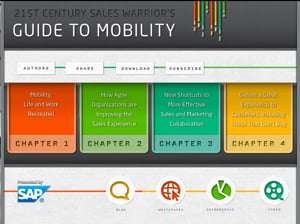Introducing the 21st Century Sales Warrior's Guide to Mobility
February 6, 2013

I’ve been involved in some way or another in helping companies to mobilise their workforces for the past 15 years, and there’s no doubt that the pace is quickening. I’m therefore delighted to have been invited by SAP to contribute to their excellent “21st Century Sales Warrior's Guide To Mobility”.
 It’s been a real pleasure to collaborate in the creation of the guide with a group of authors who I’ve long admired, including Dave Brock, Matt Heinz, Bob Thompson, and Peter Ostrow of the Aberdeen Group.
It’s been a real pleasure to collaborate in the creation of the guide with a group of authors who I’ve long admired, including Dave Brock, Matt Heinz, Bob Thompson, and Peter Ostrow of the Aberdeen Group.
Credit to my fellow writers for some outstanding and thoughtful content, and to SAP for sponsoring the guide, and for applying exceptional production values that blend thought leadership pieces, market research, video, infographics, and much more.
I think you’ll enjoy it. You can read the guide online here, or download a pdf summary here. As a taster, here’s my contribution to the piece:
How Agile Organisations are Improving the Sales Experience
Why do companies buy from your organisation? Is it because of the power of your brand, or the features and capabilities of your products, or your unbeatable value for money? According to the latest end-user research by the CEB, and despite what some traditional marketers might think, none of these factors are anything like as important as the quality of the sales experience. It’s not what you sell, but how you sell that counts.
B2B sales cycles often seem to involve an ever-increasing number of stakeholders with different issues, concerns and motivations. A single standard corporate sales pitch isn’t going to help you persuade each of them “why change?” “why now?” and “why us?”. And if you fail to adapt to their individual priorities, whilst at the same time building organisation-wide consensus around these key questions, the most likely outcome is that your prospect will simply decide to do nothing.
It’s no wonder that many sales organisations are reporting lengthening sales cycles, wild fluctuations in sales forecast accuracy and a growing number of apparently well-qualified sales opportunities fading away into a decision to simply stick with the status quo. But there is a growing number of agile sales organisations that have been able to deliver a consistently outstanding sales experience.
What can we learn from them?
Agile sales organisations tend to be much smarter about which opportunities they choose to pursue. When they think about their ideal customers, they go far beyond basic demographics to understand the structural, behavioural, environmental and situational factors that so often influence their chances of success. They do their research before the first sales call is ever made, and they deliberately structure the initial sales conversation so that they uncover these key factors.
Their conversations with prospects follow a carefully crafted sequence, starting by sharing insights that are intended to bring a fresh perspective and cause the prospect to think differently. Then they introduce issues that are likely to be important to the prospect and help them explore the impact on the prospect’s organisation—and then carefully differentiate their approach from the other options available to the prospect.
Have you noticed something?
They avoid pitching their solution until they have satisfied themselves that the prospect sees a real need to change - and focus on why they are different before they present their capabilities and prove how they help customers achieve superior results. Every sales tool, every piece of marketing collateral, has a carefully designed role to play in supporting the prospect’s buying decision process.
Most important of all, they equip their sales people to make smart decisions about what to say and how to say it most effectively when they are in conversation with the prospect - and that’s why taking an intelligent approach to mobilising their sales force can prove so effective. Let’s be clear: throwing technology at the problem and simply issuing all your sales people with iPads is likely to achieve next to nothing.
But if - like this growing number of truly agile sales organisations - you actually equip your sales people to be more effective by providing them the information they need to optimise every sales experience, then the intelligent use of technology can propel them to a whole new level.
In an agile world, sales people can tap into social media to conduct last-minute research into the latest issues affecting their prospect.
They can prepare for the discussion by reviewing structured conversation planners. They can call up sales-stage and situation-specific sales tools on the spot to help facilitate the conversation. And in any “dead time” before the next call, they can catch up with any administration - including updating their CRM in close-to-real time.
But it’s not just about making sales people more productive. These initiatives are dramatically improving the customer sales experience. Instead of having to sit through a canned, one-size-fits-all corporate presentation, the sales conversation can adapt and respond during the course of the meeting to the prospect’s specific interests. The sales person can call up a wealth of relevant information, and assemble a set of messages that resonate with what they have learned is most important to the prospect.
I’ve been involved in mobilising workforces for the past 15 years. I’ve never seen greater progress than today in the potential for the intelligent application of technology to enhance the sales process - and the buying experience. Your competitors may have cottoned on already. If your organisation hasn’t, will you be tempted to blame your next sales loss on marketing failures, product or price?
Please share this article via your favourite social media outlets - and please encourage your friends and colleagues to read the full guide.


Comments